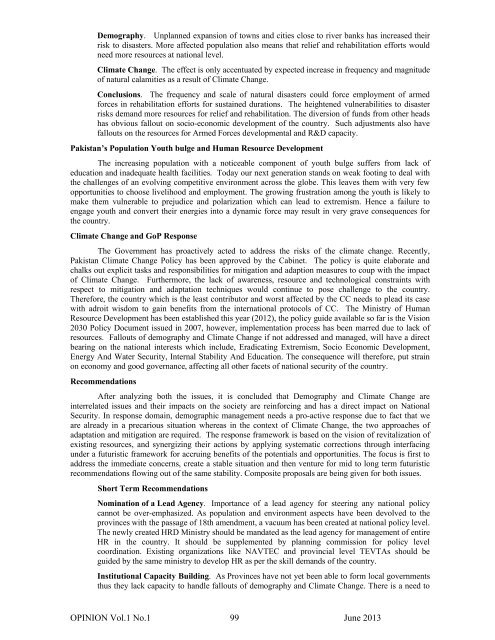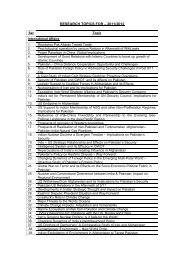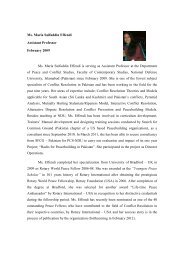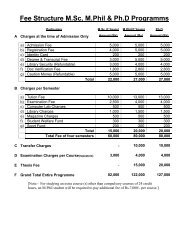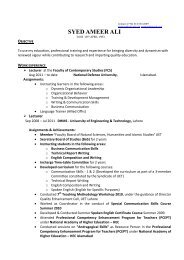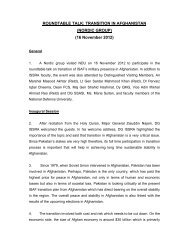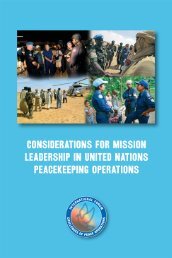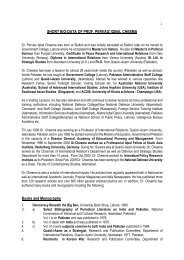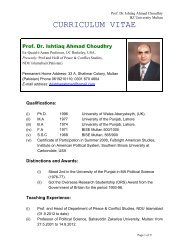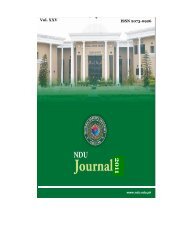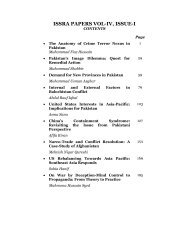OPINION Vol.1, No.1 June 2013 - National Defence University
OPINION Vol.1, No.1 June 2013 - National Defence University
OPINION Vol.1, No.1 June 2013 - National Defence University
You also want an ePaper? Increase the reach of your titles
YUMPU automatically turns print PDFs into web optimized ePapers that Google loves.
Demography. Unplanned expansion of towns and cities close to river banks has increased their<br />
risk to disasters. More affected population also means that relief and rehabilitation efforts would<br />
need more resources at national level.<br />
Climate Change. The effect is only accentuated by expected increase in frequency and magnitude<br />
of natural calamities as a result of Climate Change.<br />
Conclusions. The frequency and scale of natural disasters could force employment of armed<br />
forces in rehabilitation efforts for sustained durations. The heightened vulnerabilities to disaster<br />
risks demand more resources for relief and rehabilitation. The diversion of funds from other heads<br />
has obvious fallout on socio-economic development of the country. Such adjustments also have<br />
fallouts on the resources for Armed Forces developmental and R&D capacity.<br />
Pakistan’s Population Youth bulge and Human Resource Development<br />
The increasing population with a noticeable component of youth bulge suffers from lack of<br />
education and inadequate health facilities. Today our next generation stands on weak footing to deal with<br />
the challenges of an evolving competitive environment across the globe. This leaves them with very few<br />
opportunities to choose livelihood and employment. The growing frustration among the youth is likely to<br />
make them vulnerable to prejudice and polarization which can lead to extremism. Hence a failure to<br />
engage youth and convert their energies into a dynamic force may result in very grave consequences for<br />
the country.<br />
Climate Change and GoP Response<br />
The Government has proactively acted to address the risks of the climate change. Recently,<br />
Pakistan Climate Change Policy has been approved by the Cabinet. The policy is quite elaborate and<br />
chalks out explicit tasks and responsibilities for mitigation and adaption measures to coup with the impact<br />
of Climate Change. Furthermore, the lack of awareness, resource and technological constraints with<br />
respect to mitigation and adaptation techniques would continue to pose challenge to the country.<br />
Therefore, the country which is the least contributor and worst affected by the CC needs to plead its case<br />
with adroit wisdom to gain benefits from the international protocols of CC. The Ministry of Human<br />
Resource Development has been established this year (2012), the policy guide available so far is the Vision<br />
2030 Policy Document issued in 2007, however, implementation process has been marred due to lack of<br />
resources. Fallouts of demography and Climate Change if not addressed and managed, will have a direct<br />
bearing on the national interests which include, Eradicating Extremism, Socio Economic Development,<br />
Energy And Water Security, Internal Stability And Education. The consequence will therefore, put strain<br />
on economy and good governance, affecting all other facets of national security of the country.<br />
Recommendations<br />
After analyzing both the issues, it is concluded that Demography and Climate Change are<br />
interrelated issues and their impacts on the society are reinforcing and has a direct impact on <strong>National</strong><br />
Security. In response domain, demographic management needs a pro-active response due to fact that we<br />
are already in a precarious situation whereas in the context of Climate Change, the two approaches of<br />
adaptation and mitigation are required. The response framework is based on the vision of revitalization of<br />
existing resources, and synergizing their actions by applying systematic corrections through interfacing<br />
under a futuristic framework for accruing benefits of the potentials and opportunities. The focus is first to<br />
address the immediate concerns, create a stable situation and then venture for mid to long term futuristic<br />
recommendations flowing out of the same stability. Composite proposals are being given for both issues.<br />
Short Term Recommendations<br />
Nomination of a Lead Agency. Importance of a lead agency for steering any national policy<br />
cannot be over-emphasized. As population and environment aspects have been devolved to the<br />
provinces with the passage of 18th amendment, a vacuum has been created at national policy level.<br />
The newly created HRD Ministry should be mandated as the lead agency for management of entire<br />
HR in the country. It should be supplemented by planning commission for policy level<br />
coordination. Existing organizations like NAVTEC and provincial level TEVTAs should be<br />
guided by the same ministry to develop HR as per the skill demands of the country.<br />
Institutional Capacity Building. As Provinces have not yet been able to form local governments<br />
thus they lack capacity to handle fallouts of demography and Climate Change. There is a need to<br />
<strong>OPINION</strong> <strong>Vol.1</strong> <strong>No.1</strong> 99 <strong>June</strong> <strong>2013</strong>


